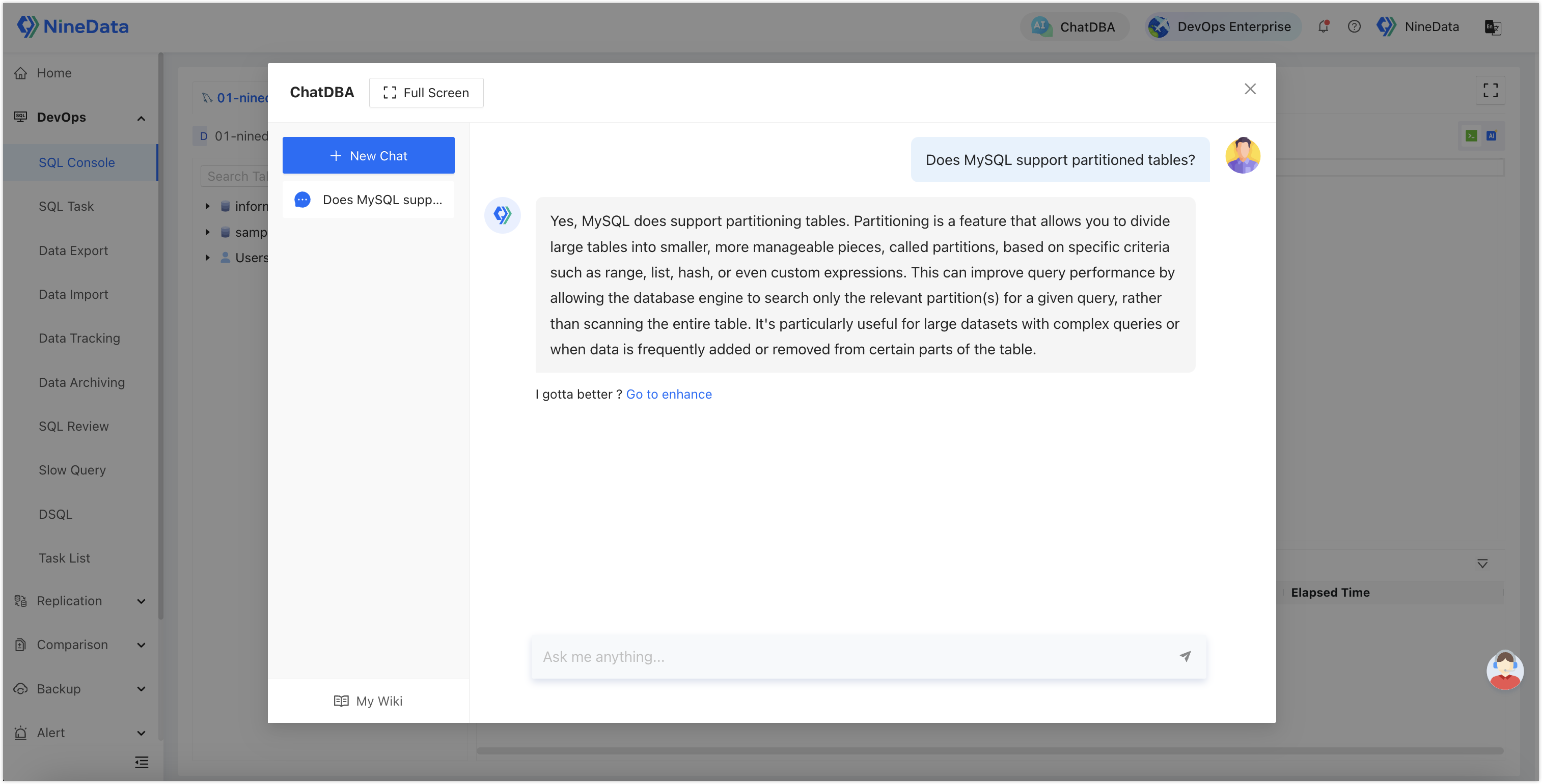NineData vs Bytebase
NineData and Bytebase are both products in the database DevOps field. Bytebase emphasizes change management concepts more and is currently targeting overseas markets. On the other hand, NineData focuses more on promoting multi-cloud and multi-source support for cloud databases and domestic databases, emphasizing the enhancement of database efficiency and security, and is currently targeting the domestic market.
NineData provides a permanent free version of the Database DevOps Professional Edition with specifications for up to 10 data sources under the SaaS model. Users can register and use it without the need to prepare application servers and database hardware, which is very convenient for small and medium-sized teams.
Bytebase is open-source and provides Docker-based local installation, which is relatively convenient. It offers a free usage quota for up to 5 instances, supporting basic functionalities. Upgrading to the professional or enterprise edition is required for exceeding this limit.
Features Comparison
| Feature Category | Feature | Bytebase | NineData |
|---|---|---|---|
| Basic Capabilities | Deployment Mode | Cloud (SaaS), On-premise | Cloud (SaaS), On-premise |
| Open Source | Yes, Apache License, free for up to 5 instances, requires paid upgrade to Professional or Enterprise edition for more than 5 instances | No, free for up to 10 database instances (Cloud mode), charges apply for more than 10 instances | |
| Data Source Support | 14 | 60 | |
| Cloud Platform Adaptation | Not supported | Alibaba Cloud, Tencent Cloud, Huawei Cloud, Baidu Cloud, China Mobile Cloud, AWS, GCP | |
| Login Modes | Username/password, SSO(LDAP), Google, GitHub, Microsoft | Username/password, SSO(LDAP), WeChat | |
| Language Support | Chinese, English, Japanese, Spanish | Chinese, English | |
| Database DevOps | SQL Console | Supported | Supported |
| Object Visualization Management | ❌ | Supports tables, views, stored procedures, functions, triggers, events | |
| Query Result Set Operations | View, Search, Export | View, Modify, Search, Filter, Export | |
| Session Isolation | ❌ | Supported | |
| SQL Audit & Release | SQL Change Release | Supported | Supported |
| Change Auto-backup | Supported | Supported | |
| Approval Process | Supported | Supported | |
| OnlineDDL | Supported | Supported | |
| OnlineDML | ❌ | Supported | |
| Built-in SQL Specifications | 100+ | 100+ | |
| Mobile Approval | ❌ | Supported | |
| Release Process Orchestration | ❌ | Supported | |
| Data Security | Sensitive Data Protection | Supported but not rigorous, easily bypassed | Supported |
| Permission Authorization Mode | Administrator authorization, user-initiated application | Administrator authorization, user-initiated application | |
| Permission Model | Users, roles, data sources, groups | Users, roles, data sources, environment groups | |
| Operation Audit | Supported | Supported | |
| Advanced Data Processing | Data Import | ❌ | Supported |
| Data Export | ❌ | Supported | |
| Data Archiving | ❌ | Supported | |
| Data Tracking | ❌ | Supported for MySQL | |
| Database Union Query | ❌ | Supported | |
| Performance Diagnosis | Slow SQL Performance Analysis | Supported for MySQL, PostgreSQL | Supported for MySQL, Oracle, Db2, PostgreSQL, OceanBase Oracle |
| Session Management | ❌ | Supported | |
| Other | AI Big Model Integration | Supports Text2SQL | Supports Text2SQL, AI SQL Diagnosis, ChatDBA |
Detailed Differences One: Product Installation and Deployment Modes
- NineData: It defaults to recommending the Cloud (SaaS) mode. Users can register an account on the official website and start using it immediately. It also offers a local deployment mode for enterprises with higher data compliance requirements (requires preparation of application and database servers).
- Bytebase: An open-source product that primarily advocates for local installation and deployment mode (requires preparation of application and database servers). It also provides an online SaaS version.
Detailed Differences Two: Open Source and Free
- NineData: The code is not open source. The Cloud platform offers a perpetual free version of the Database DevOps Professional Edition for up to 10 data sources, with charges applicable for more than 10.
- Bytebase: Open-source under the Apache license, the free version supports management of up to 5 data sources, with charges applicable for more than 5.
Detailed Differences Three: Supported Database Types
- NineData: Supports over 60 types of databases including MySQL, Oracle, PostgreSQL, SQLServer, MongoDB, etc.
- Bytebase: Supports 14 types including MySQL, PostgreSQL, TiDB, ClickHouse, Snowflake, RedShift, MongoDB, Spanner, etc.
Detailed Differences Four: Cloud Platform Support
- NineData: Supports mainstream cloud platforms such as Alibaba Cloud, Huawei Cloud, Tencent Cloud, Baidu Cloud, China Mobile Cloud, AWS, etc. It enables automatic retrieval of cloud database information via Cloud platform APIs without manual input, and supports private network connection via VPC.
- Bytebase: Not supported.
Detailed Differences Five: SQL Console
SQL editing window is the core functionality for developers to operate databases, similar to database client tools, and both products support it.
NineData: Provides a user experience similar to Navicat, DBeaver, supporting comprehensive object navigation, as well as visual operations on various objects like tables, views, stored procedures, etc. The SQL editing features include intelligent prompts for more precise and efficient editing. Result sets support editing, copying, searching, sorting, exporting, etc. Enterprises using NineData can eliminate the hassle of installing various database client tools.
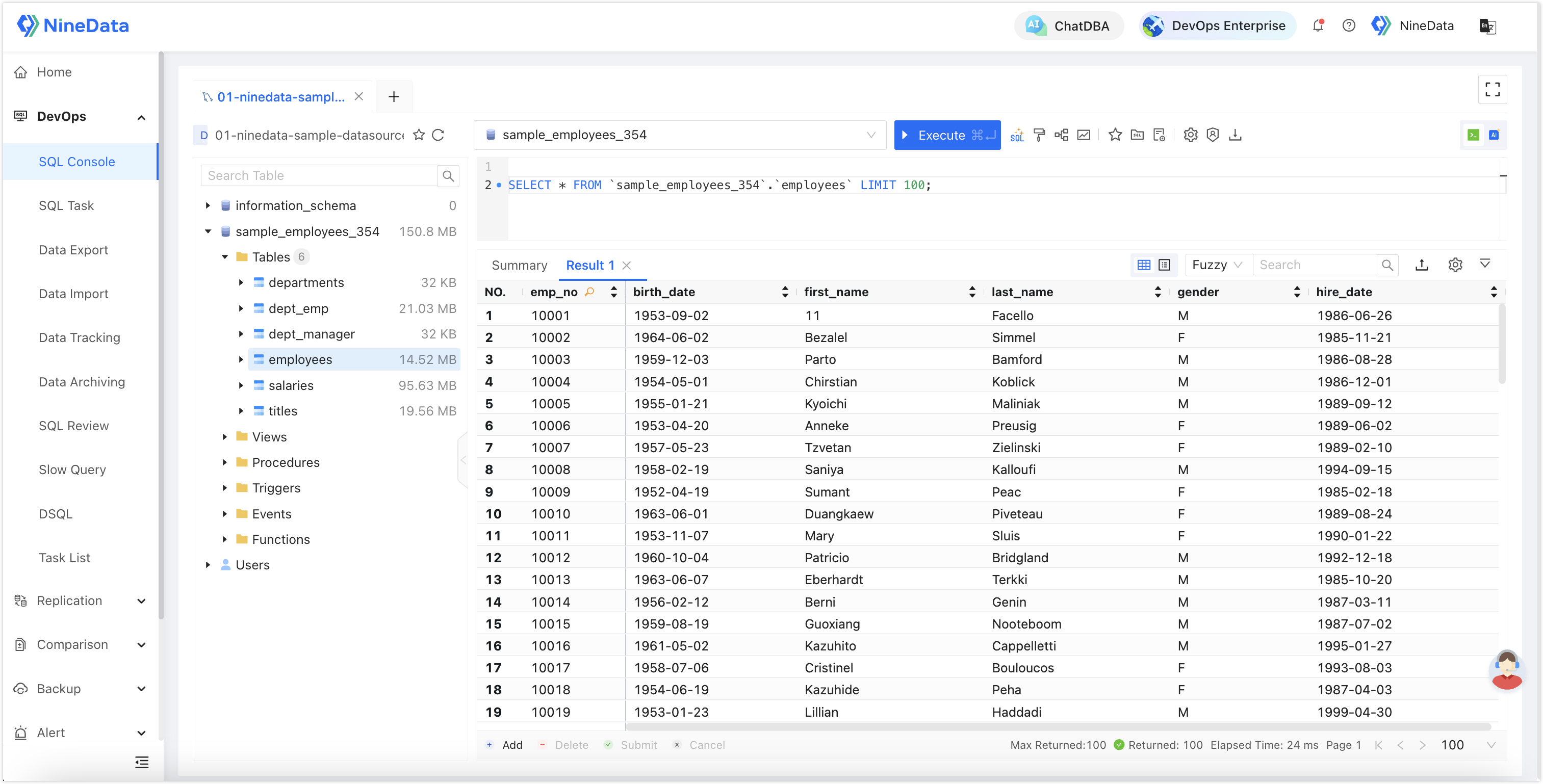
Bytebase: Provides basic capabilities for SQL editing, code prompts, and displaying query results.
Detailed Differences Six: SQL Audit and Deployment
Bytebase's main functionalities include standard SQL task submission, audit, execution, and data change backup features, with MySQL database supporting OnlineDDL.
Compared to Bytebase, NineData has the following advantages in the above functionalities:
- OnlineDML: Valuable for correcting large batches of data, as it may affect business operations. NineData includes automated OnlineDML capabilities to improve operation efficiency and database stability by automatically executing changes in batches.
- SQL Task Pause: Supports manual pause of SQL tasks during execution.
Detailed Differences Seven: SQL Development Standards
SQL development standards are a crucial component of enterprise database development specifications, such as primary keys, field types, field naming conventions, etc., which are core capabilities of database DevOps products.
- NineData: Supports over 100 audit standards.
- Bytebase: Supports over 100 audit standards.
Detailed Differences Eight: Sensitive Data Protection
Sensitive data protection is crucial for preventing data leaks, and both NineData and Bytebase provide data desensitization capabilities.
NineData: Offers rigorous sensitive data protection and recognition capabilities, automatically desensitizing various complex SQL.
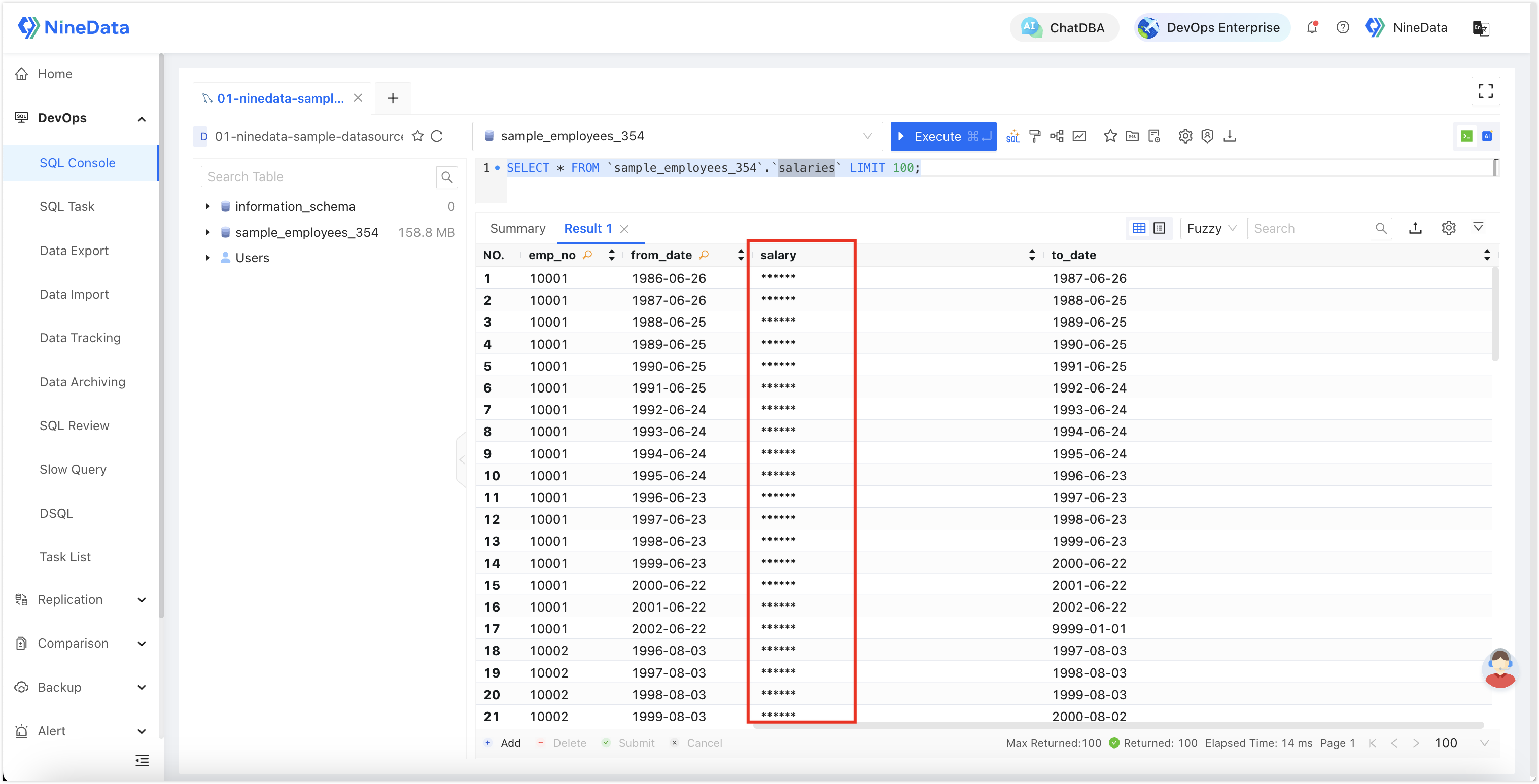
Bytebase: Although it has sensitive data field configuration functionality, it can be easily bypassed with SQL, rendering it ineffective. It should not be used in production environments.
Detailed Differences Nine: Permission Handling Modes
Both NineData and Bytebase provide administrators with the ability to grant permissions on the backend and for users to apply for permissions proactively.
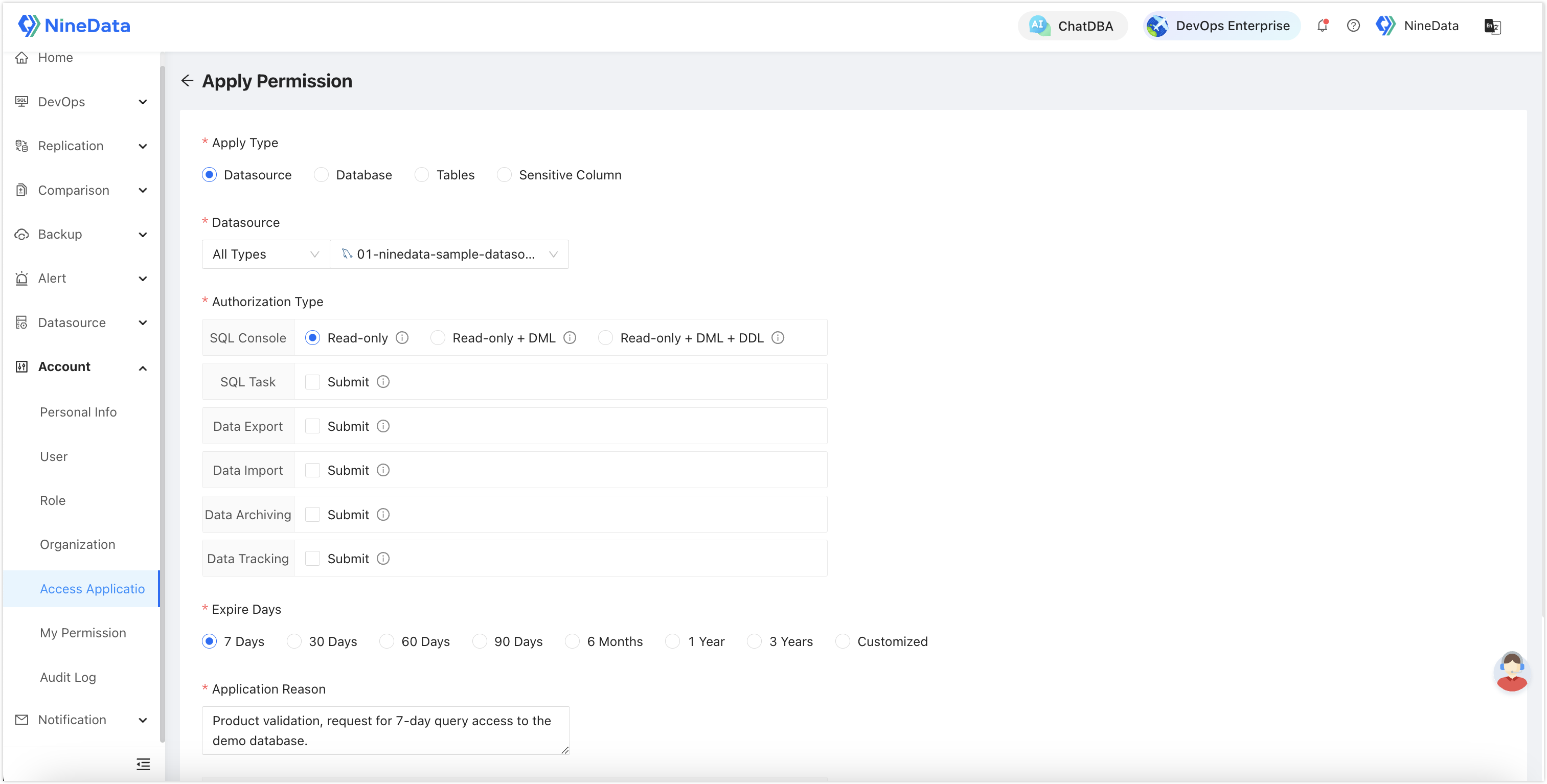
Detailed Differences Ten: Multi-language Support
- NineData: Chinese, English.
- Bytebase: Chinese, English, japanese, Spanish.
Advanced Features Supported by NineData but Not Bytebase
Data Import: Suitable for importing large batches of data into databases, supporting single-file sizes up to 5 GB, and supporting SQL scripts or CSV file formats.
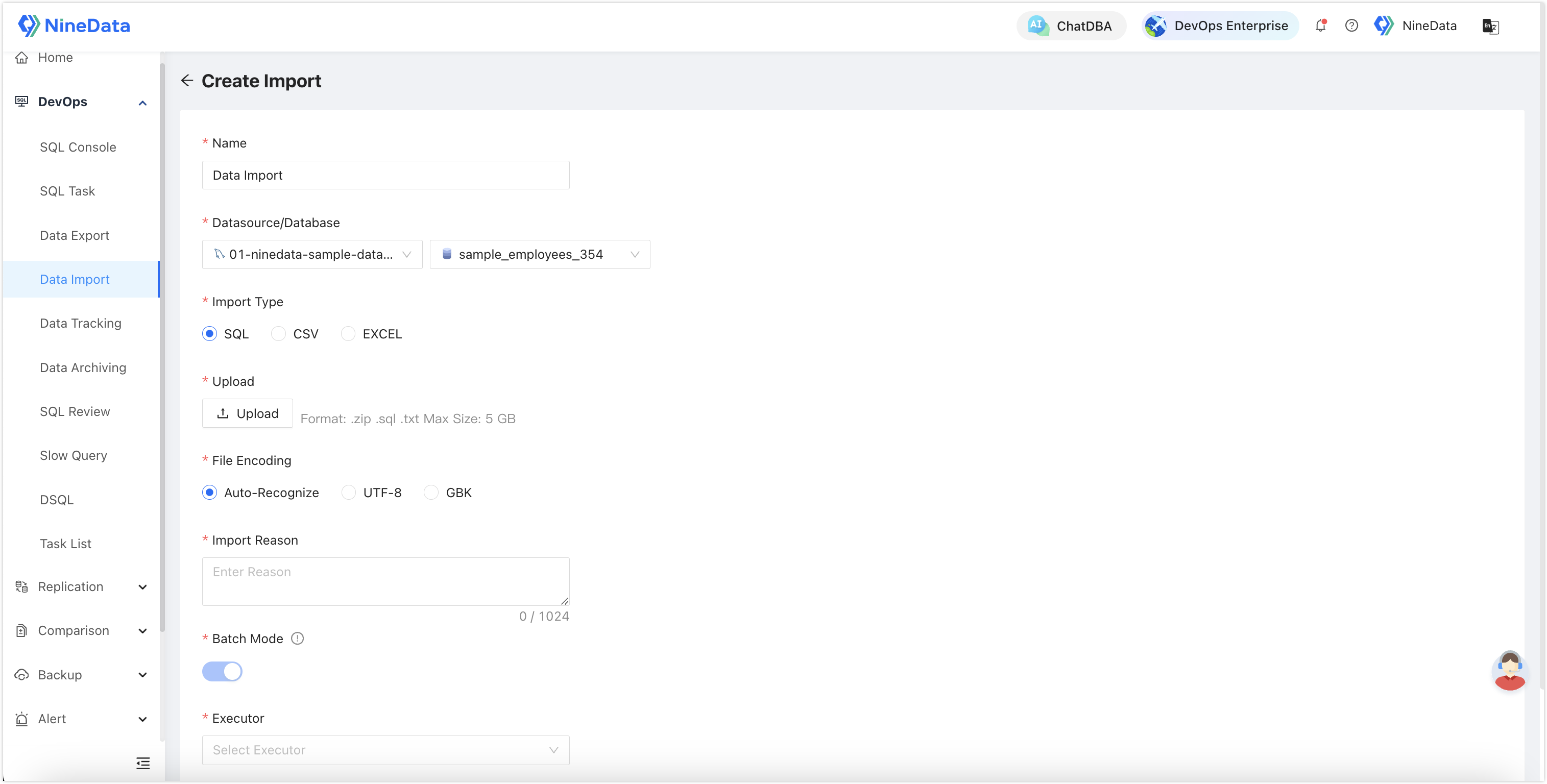
Data Export: Suitable for quickly exporting data, supports automatic data export desensitization, and allows selection of entire databases, multiple tables, or exporting via SQL statements.
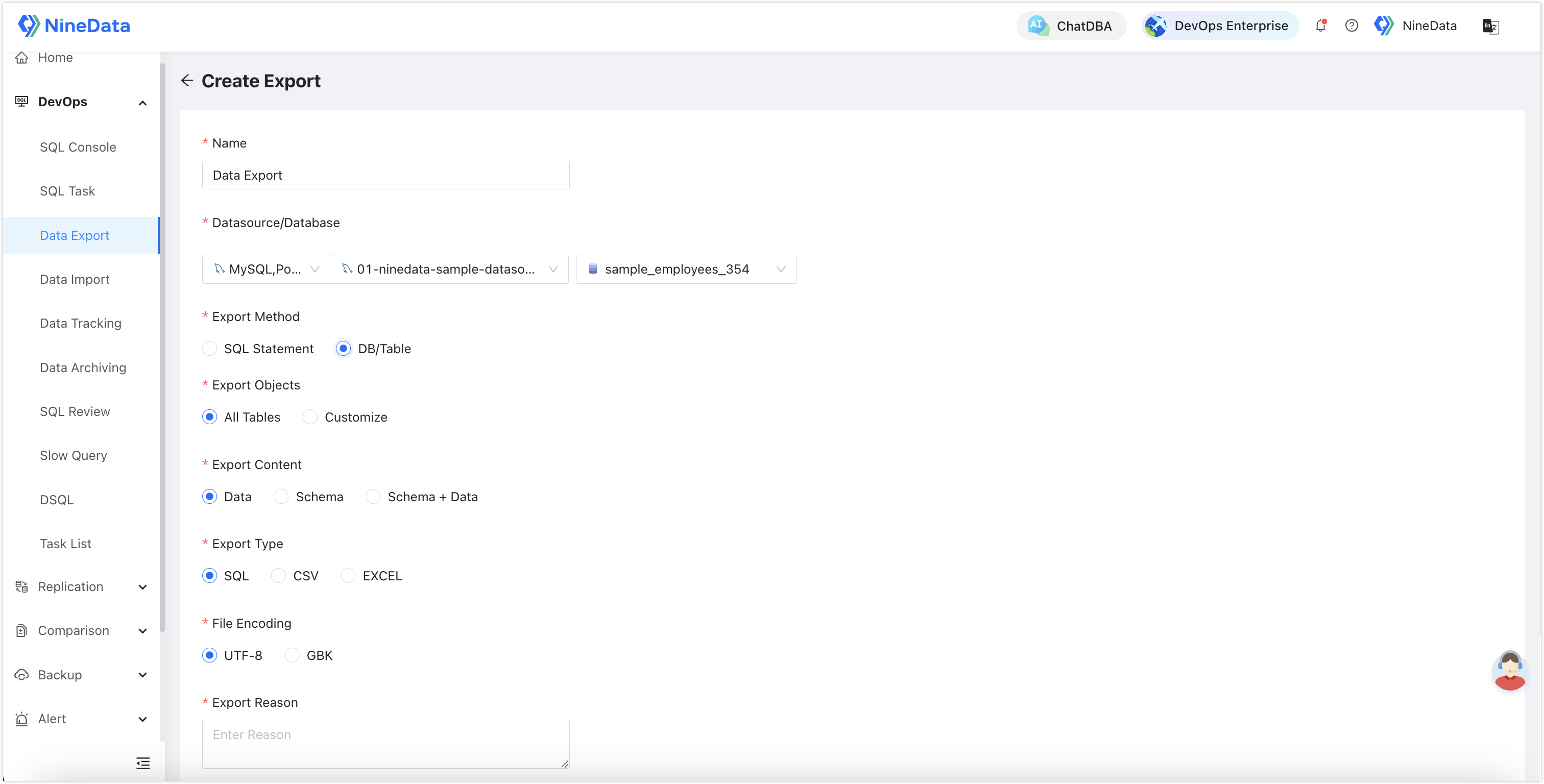
Data Archiving: Used for archiving historical data, allowing configuration of cleanup rules and scheduled execution (Bytebase can support MySQL databases through the pt-archive plugin).
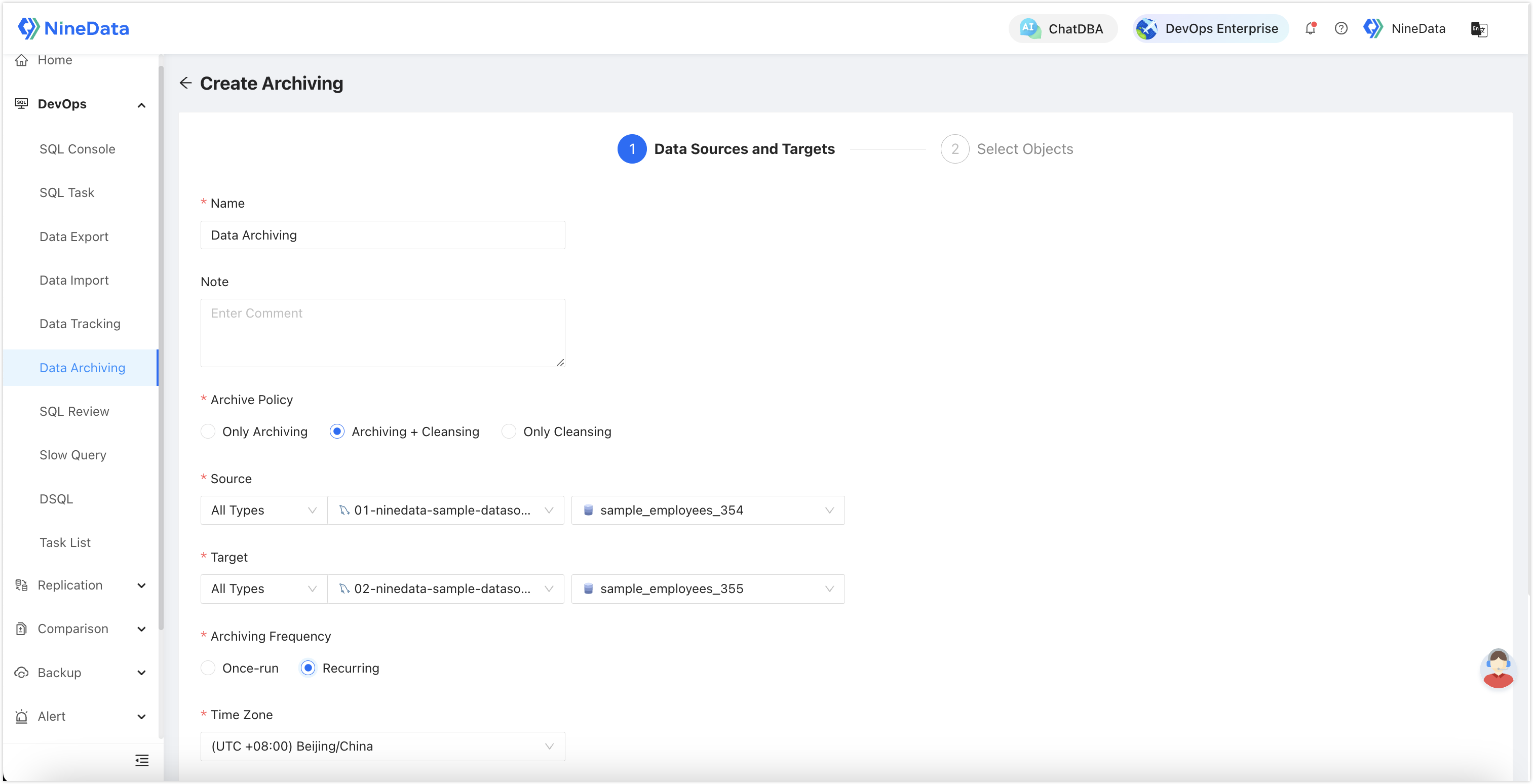
Data Tracking: Supports querying historical data change tracking, suitable for quick rollback after accidental operations, currently supporting MySQL databases.
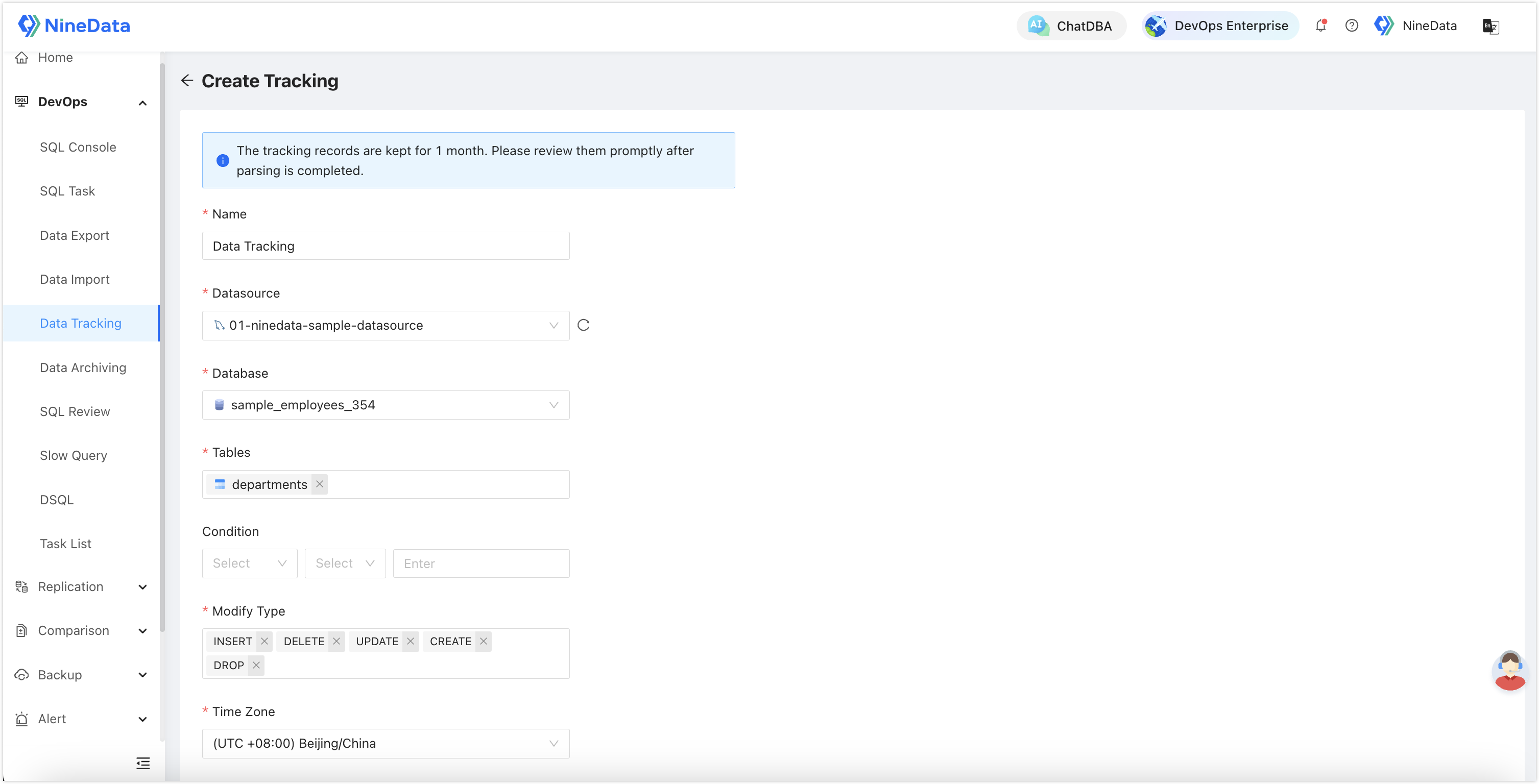
Session Management: Supports real-time session status queries for databases, killing sessions, and statistical grouping by client, login user, and session status.
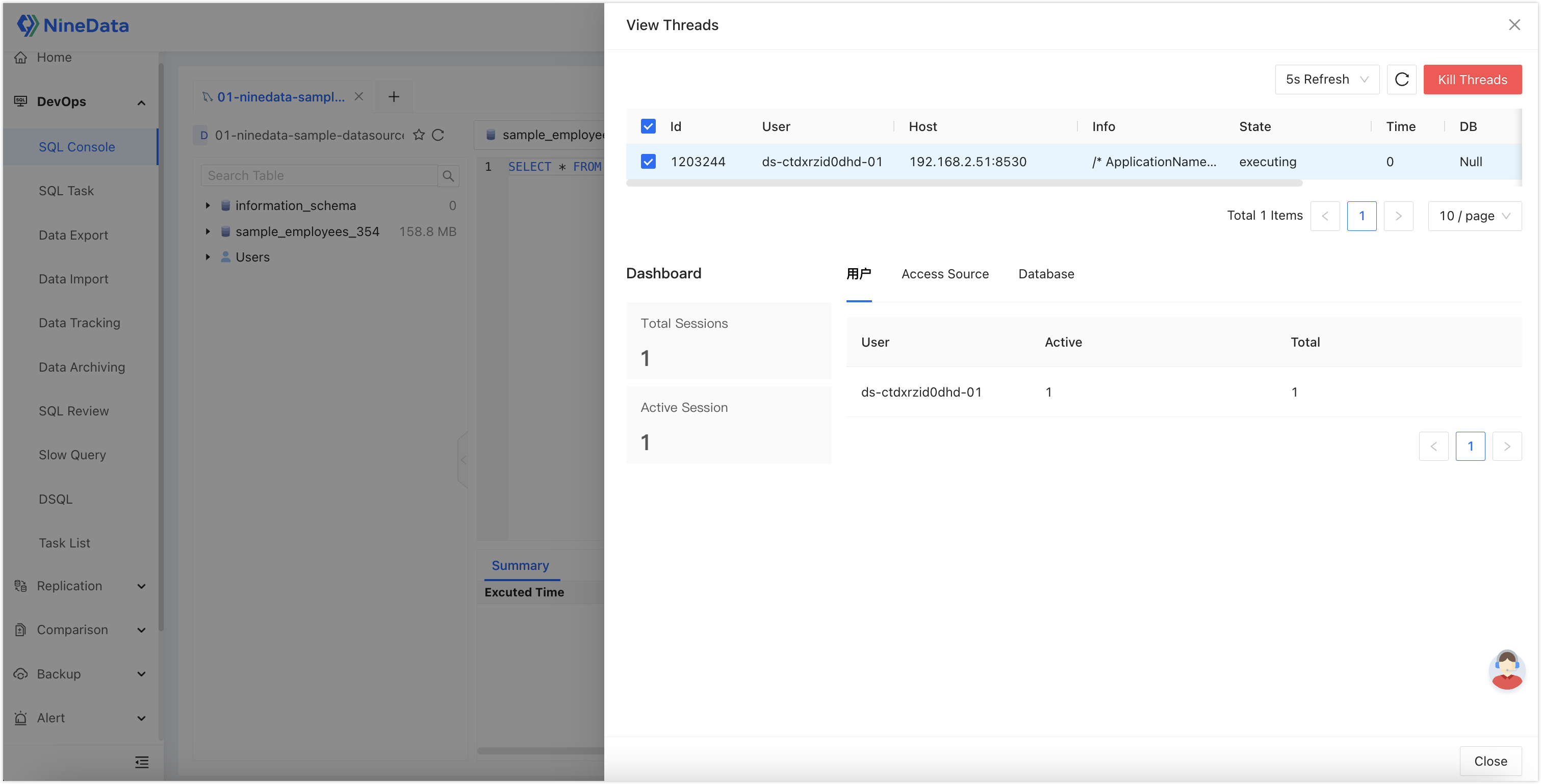
Slow SQL Management: Supports automatic collection, analysis, and diagnosis of historical SQL executions in databases.
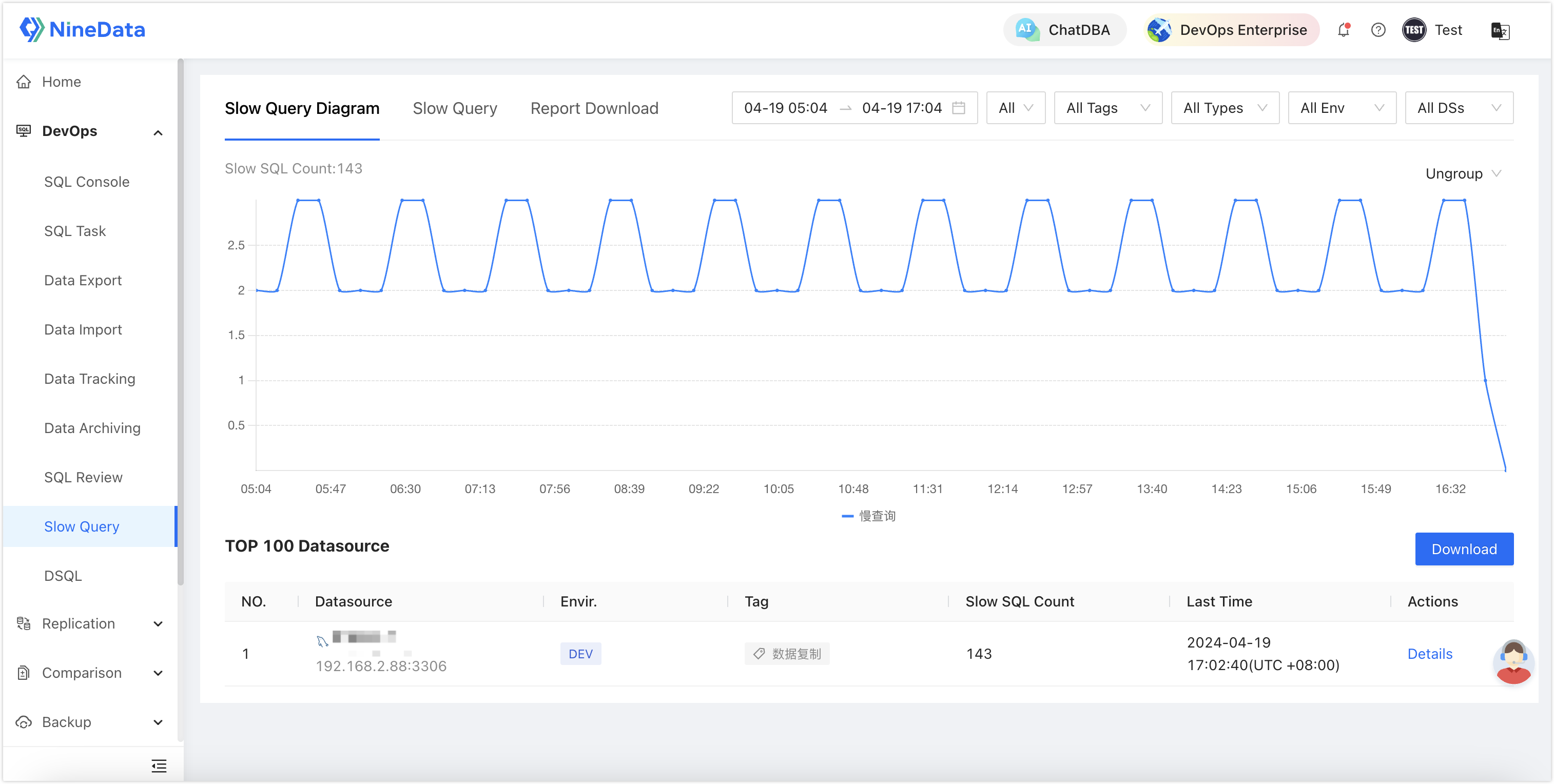
Development Process Orchestration: Provides database CI/CD capabilities, supporting enterprise configuration of database release processes for development, testing, production environments, etc.

AI Big Model Integration: Based on large model AI technology, provides innovative capabilities such as natural language generation of SQL, SQL intelligent optimization, ChatDBA, etc.
